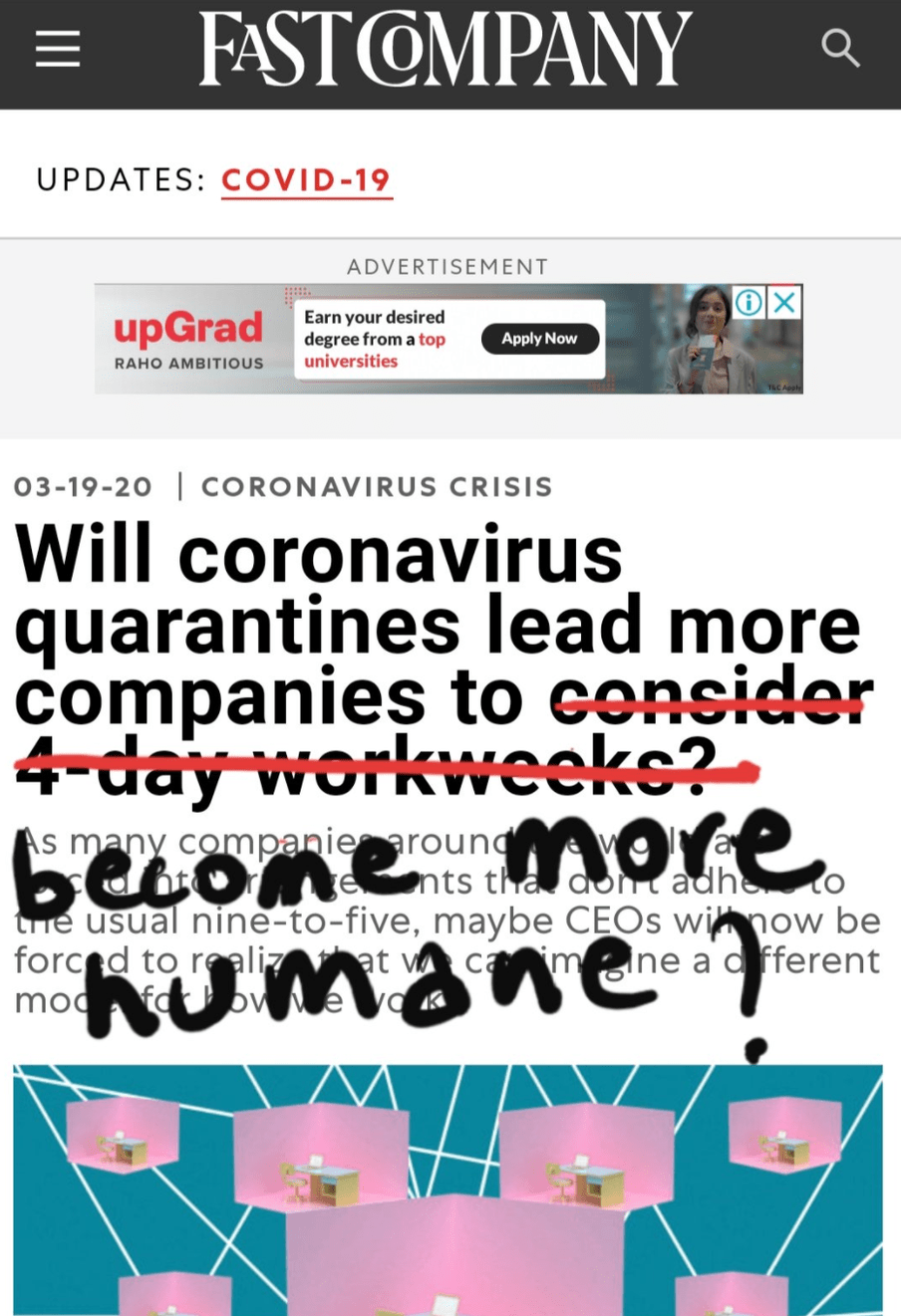Hi,
The only way to maintain sanity at a time like this is to keep believing in the possibility of a future. Think of it like pressing the reset button. A chance to wipe our slate clean and start from scratch.
How would you want the new world to look? Would you, as my colleague Eric Holthaus wondered, want to be in a world where we love nature more?
Or, as Irene Caselli described, a world where the adults never stop learning from the children?
I will tell you what my dream is for the future. I am waiting for the day when all of this is over and people return to their workplaces – many dealing with trauma and PTSD triggered by personal illness, deaths in close circles, job losses, or just the environment of hopelessness and panic all around – and make their bosses terribly uncomfortable by refusing to hide it.
Thanks to the worst global pandemic several generations have seen – one that is being compared with such catastrophic events as The Great Depression and the world wars – we are having a collective meltdown. And god bless social media, we are not afraid to talk about it.
But more crucially, with the boundaries between "office" and "home" evaporating on the back of an indefinite period of work from home, the cognitive dissonance that so many experienced in the pre-pandemic world is also receding. In the new world, employees will demand that employers treat them as integrated individuals, not machines who can leave some unproductive or inconvenient parts at home, or stop themselves from bringing up "awkward" topics at work because doing so is not "professional".
The mental health genie is out, managers. I respectfully submit that you deal with it.
This is the time for everyone employed at an office – from the top down – to be given urgent training on normalising mental health conversations at the workplace. If you are a CEO, use the work from home window to organise video sessions with mental health experts. Make attendance mandatory. Do whatever it takes to get ready.
This time there will be no going back. Leaders of all hues, foot soldiers of all hues, in every kind of organisation will be affected. Whether or not they were directly touched by the virus. The time for denial is over. Train, train, train the heck out of your teams. Incentivise humane, sensitive behaviour by baking it into performance appraisals. Reward empathy. Penalise the jerks. Do everything. Stop at nothing.
But of course, I am dreaming. In reality, I worry that this crisis might bring out the worst prejudices in managers, many of whom are themselves in denial about their own mental health issues. Corporations might find renewed impetus for rewarding the "strong" and running down the "weak". The logic of cost cutting to boost virus-hit bottom lines could be used to justify such behaviour.
In the final analysis, I believe this is an opportunity for us to press for far-reaching changes in corporate culture. Not just superficial changes like shorter working weeks, because four days in a bad workplace are worse than six days in a good one. But workplaces where no one is penalised just for being human.

What do you think is likely to happen in the post-Covid-19 world? Will corporate culture change and mental health conversations become mainstream at work?
PS: As I write this, I realise that even the most radical vision of rewiring the "workplace" leaves out a large part of the world’s working population that doesn’t work in the formal sector or has no "regular" employment. Will anything change for them post-pandemic?
Write to me. And stay safe, my lovelies.
 Would you like this newsletter sent straight to your inbox?
Subscribe to my weekly newsletter where I dismantle myths around Sanity, discuss the best ideas from our members, and share updates on my journalism.
Would you like this newsletter sent straight to your inbox?
Subscribe to my weekly newsletter where I dismantle myths around Sanity, discuss the best ideas from our members, and share updates on my journalism.

